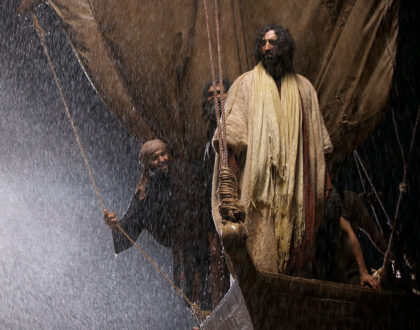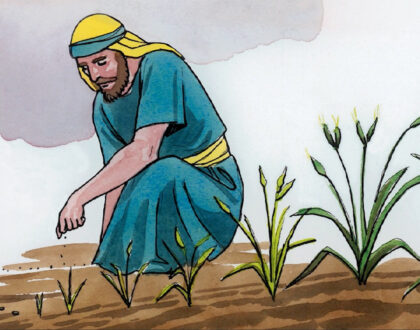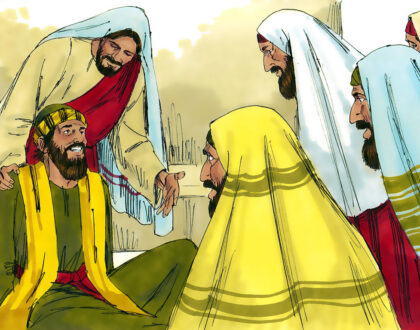Forgive, Restore And Build

“Forgive, Restore And Build”
Archbishop Loren Thomas Hines
Fourteenth Sunday of Ordinary Time
(23rd Anniversary of the Consecration of Archbishop Hines)
September 17, 2017
Readings: Ecclesiasticus 27: 30-28: 7, Psalm 103: 8-13
Romans 14: 5-12
Matthew 18: 21-35
“This is the day that the Lord has made; we will be glad and rejoice in it.” If God made this day and Christ fulfilled it, then this day is blessed because everything that God created is very good. As we gather together in the presence of God, we should expect great things from God. We have much to give thanks for. Today we are blessed because our brothers from India are with us. Bishop Jaison is here. What joy!
Being one with Christ and being His body, we should live out our lives as a witness to His life. The world teaches us to live our own lives and be what we want to be, but Scripture gives us a different pattern and instruction. It tells us that whatever we do, whether we live or die, it’s all for the glory of God. It’s not for us. In Christ we are given directions and instructions that we are commanded to follow. Psalm 119 tells us that the sum total and not just a portion of the Word is truth. We have learned a few choice Scripture and we keep repeating them and build our whole life around them when in reality, they are only a portion of the truth. Every part of Scripture derives its meaning from the whole. There’s no part of Scripture that is independently understood from the rest. Each individual part is derived from the complete Scripture given to us by God. The whole derives its meaning from Christ. He is the source of it all. This means that every part of Scripture is interwoven with the same truth and understanding. There is nothing separate from the major direction of the Scripture.
Scripture teaches us that God is love and the whole bible is interwoven, built upon and founded upon love. There’s nothing in the bible that’s not based on that truth and we should read it integrating that truth into our thoughts, interpreting it according to the love that God is. God loves His people. The love, mercy and unity are there because God’s Kingdom is unified. There are no divisions within the Kingdom. Restoration is the foundation of all that’s in the bible because it is based on love. There’s no destruction in the Word of God, only life, hope and provision. In Ordinary Time we are challenged to live out the life that Christ has given us. It’s more than a challenge; it’s a command. And yet many of us don’t understand that Scripture is based on one fact and one truth interwoven in every thought with God’s love for man.
Let me just give a few thoughts as a background for today’s Gospel. In Ephesians 4: 32, we are instructed to: “Be kind to one another, tender-hearted, forgiving each other, just as God in Christ also has forgiven you”. This is God’s direction on how we are to live. Matthew 6:14-15 “If you forgive others for their transgressions, your heavenly Father will also forgive you. But if you do not forgive others, then your Father will not forgive your transgressions”. Matthew 7:1-2 “Do not judge so that you will not be judged. For in the way you judge, you will be judged, and by your standard of measure, it will be measured to you”. How do we treat each other? How do we live our lives? We set the course and direction for how we will be treated; of what’s going to happen in our lives. Colossians 3:13 “Bearing with one another and forgiving each other, whoever has a complaint against anyone; just as the Lord forgave you, so also should you”. Here are God’s commandments given to us so that we can walk in His ways. He gave us new life, with the ability and power to be like Him. Having been given all this, He now expects us to live them out.
We pray what we call The Lord’s Prayer several times a week. The prayer says, “Forgive us our transgressions/debts as we forgive the transgressions of others”. We pray that yet we hold bitterness and anger in our hearts for one another. The Scripture talks about love from cover to cover; about restoration and how our lives should be like Christ’s. Yes, there are times for discipline and correction, but these should be based on one foundation and done for one purpose only – restoration; bringing back into the Kingdom of God those who, for a moment, have failed or fallen out.
In last Sunday’s Gospel from Matthew, we were told how we are to handle a problem where a brother sins against us. We go to that brother and show him his fault in private. If we understand Scripture, we will go to our brother in love, not in accusation and condemnation. We go in love and exert all effort to restore him. If he doesn’t accept, we are told to bring two or three with us, then go back to him with an attitude and understanding that we are there to restore him to the life that God has given him. If he still doesn’t desire to change, we are to go to the church and if he still won’t listen to the church, we are to treat him as a Gentile. But if we understand Scripture, we know that Christ loved the Gentiles also. He didn’t forsake them or cast them out. He restored them also; He restored us. Thank God! The attitude we should have is not to destroy but to restore. We are responsible for restoration.
In 1 Corinthians 5, Paul wrote to the church in Corinth and told them that someone in the church was living with his father’s wife, taking her as his own. The church just accepted the wrong being done. They hadn’t done anything about it. In response to Paul, the church removed the errant member. Later in 2 Corinthians 2:6-7, Paul again confronts the issue saying, “Sufficient for such a one is this punishment which was inflicted by the majority, so that on the contrary you should rather forgive and comfort him, otherwise such a one might be overwhelmed by excessive sorrow”. Such a one might be destroyed by excessive sorrow. The purpose of discipline is restoration; to bring the errant person back in. In one of his writings, St. Basil wrote that to punish a man without healing is worthless because the purpose of the discipline is to bring him back to his place in the body of Christ, not to remove him. The whole Scripture is based on love, not on destruction; not on division but on unity and on the principles of God.
In today’s Gospel, we see Peter asking Jesus, “Lord, how often shall my brother sin against me and I forgive him? Up to seven times?” Jesus said to him, “I do not say to you up to seven times, but up to seventy times seven”. If you check the Scripture, you’ll find out that back in the Old Testament, we are told to forgive seventy times seven times. That’s a whole lot of time. I don’t know if anybody can hold out for seventy times seven. This tells us that we are not given permission to have bitterness, hatred or unforgiveness in our hearts because these are totally foreign to the Kingdom of God.
When we look at the story that follows as Jesus explains it, it shows the picture of a master who, for some reason, was making an accounting of all his wealth. Upon checking his accounts, he found out that the one he has put in-charge of all his wealth had taken for himself a tremendous amount of the master’s properties and wealth. I tried to find the approximate amount of how much the servant took and in today’s prices, it would probably be in the trillions of pesos – an amount he could never return or repay. He was approached by the master with the charges and commanded him to be sold, along with his wife and children and all he had, and repayment to be made. The servant appealed to the master, got down on his knees and begged for mercy. The master felt compassion for him and released him and forgave him the debt. The servant went out excited because he was forgiven and because he knew the magnitude of his debts. He then saw one of the servants who worked for him and he was reminded that this servant owed him money, probably P50k, a very negligible amount compared to what he himself owed his master. When he asked the servant for recompense, the servant said he didn’t have the money and begged for mercy to pay him back over time. The servant didn’t extend mercy to his fellow servant, and he took the wife and children of his fellow servant and sold them to get his money back. Upon learning of what this servant did, the master became angry. He said, “You wicked slave, I forgave you all that debt because you pleaded with me. Should you not also have had mercy on your fellow slave?” The master then handed him over to the torturers until he should repay all that was owed him.
We might ask, “How does this story affect us?” It affects us the same way because what God has done for us is in the category of the master. God has given us everything; we lack in no good thing. Everything pertaining to life and godliness has been given to us. He has wiped away all our transgressions and has given us a new life of holiness and righteousness. What He has done for us is impossible for any of us to achieve. He forgave us yet we when we look at each other, we see the transgressions that have been committed against us, like the other servant’s transgressions – small, yet we hold them in our hearts and we refuse to forgive. Remember that the theme of whole bible is love. Forgiveness is an act of love. Maybe we feel justified; that we’re right and they are wrong. It doesn’t matter. We are not to judge them, but instead forgive them just as we have been forgiven. Otherwise like the master in the Gospel, God will say to us that because we have not forgiven, He will not forgive us, either. This challenges us because we live in a world of bitterness and anger and unforgiveness. When we hold on to our anger and bitterness, we won’t be forgiven.
Romans says, “Why do you judge?” One day every knee will bow and every tongue will confess before God. He’s the One who judges, not us. Everyone will give an account of his life before God and if there’s anything that the Church needs to learn today, it’s to forgive. The bitterness among the different denominations is wrong. We are to forget the faults and instead see the character of God in every man. We see the world constantly in bitterness and anger, and why wouldn’t they be when the Church is doing exactly the same thing? We must forgive. We have no choice, no right to hold bitterness in our hearts. It doesn’t mean we’re all going to be alike. We won’t; we’re different. Look at these bishops here. None of us are alike. They have different ideas, but God created them and gave them a task and responsibility. I should not be the one to judge them. It’s not my business to judge another. God is the Judge. He says that if a person does something wrong, we are to leave room for His correction. He will take care of it. Who are we to take His place? We’re told to show love, mercy and compassion; to restore and not destroy. John 10:10 “The thief comes only to steal and kill and destroy….” Are you the devil’s servant? The book of Revelation says that hell is reserved for the devil and his angels. Are you one of his angels, destroying? Our task is to build, restore and to live in love. Even if our mind tells us to be angry, we smile and tell them that we love them. It’s not always easy but when you take the step of faith, God will be there to give you the strength and power that you need to live out His life. John 3:16-17: He came to bring us new life. Jesus said, “I came not to judge but to save”. If this is the work of Christ and we are His body, is this not our commission, task and responsibility also? How can we make a big thing out of the little, insignificant things? We are to forgive.
God created each of us different. Thank God! Can you imagine if everyone of you look like me and think like me? The world would be colorless and blah. But God created us different for a reason. The lessons in this season of Ordinary Time are commanding us to live out the life of Christ everyday; not fault-finding and magnifying the problems but magnifying the love of God that is within us. We let God be love to the whole world. What hope we would have if this were true!
I wouldn’t want to be in the position of some of the world leaders today because they so much as sneeze and they are attacked. Ridiculous! What we need to realize is the old things have passed away and all things are new. Yes, there’s going to be evil around us. Don’t worry about it. Several weeks ago, we read from Jeremiah that we are just to worry about ourselves being cleaned up. God will take care of the rest. Sometimes we want to change the world, but we must start with us, then the world will change. I read an article recently which says that if you want to rule the world, start by making your own bed. Very simple. If we order our own life, the rest of the world will follow. So I encourage us to be what God wants us to be. Do not be vengeful. God will take care of the revenge. That’s His task, not ours. Forgive and be forgiven. If you refuse to give mercy, can you expect peace? If you nourish anger, can you expect healing? Hate not. Overlook the faults of others. You be the witness and show them how great God is by doing what’s right. This is our challenge. Start with yourself.
So on this celebration that we have today, may we learn forgiveness and restoration. When someone fails, don’t gossip about him. Don’t go to Facebook and tell the whole world how stupid they are. When you do, you’re the one being stupid because you’re not following the principles of God. We forgive because God has forgiven us. “Fix your bed.” When we take care of the little things, the big things will come into our lives. We celebrate the greatness of God by being obedient to Him.
Recent Sermons

Jesus, Calmer Of Storms
June 23, 2024

Harvest Time Stemming From The Smallest Seed
June 17, 2024

Not Bound By Limitations To Minister
June 10, 2024

